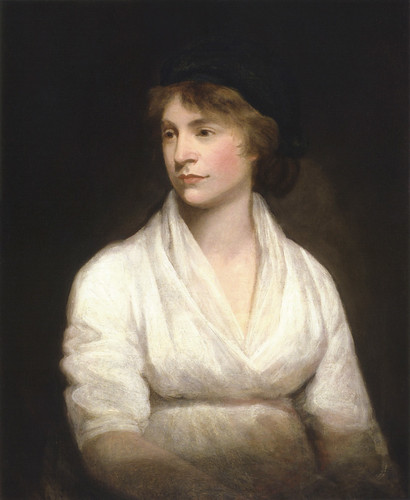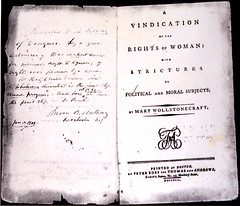Mary Wollstonecraft @250
John Opie, Mary Wollstonecraft, (c. 1797)
A Vindication of the Rights of Woman
Mary Wollstonecraft (1759 – 1797), English philosopher and early feminist, author of A Vindication of the Rights of Woman and mother of Mary Shelley who would become the author of Frankenstein.
She was one of the first writers to mention a philosophy of sex; she referred to it as a philosophy of lasciviousness.
A Vindication of the Rights of Woman quoting from Rousseau‘s Emilius:
“In the union of the sexes, both pursue one common object, but not in the same manner. From their diversity in this particular, arises the first determinate difference between the moral relations of each. The one should be active and strong, the other passive and weak: it is necessary the one should have both the power and the will, and that the other should make little resistance. This principle being established, it follows that woman is expressly formed to please the man: if the obligation be reciprocal also, and the man ought to please in his turn, it is not so immediately necessary: his great merit is in his power, and he pleases merely because he is strong. This, I must confess, is not one of the refined maxims of love; it is, however, one of the laws of nature, prior to love itself. If woman be formed to please and be subjected to man it is her place, doubtless, to render herself agreeable to him, instead of challenging his passion. The violence of his desires depends on her charms; it is by means of these she should urge him to the exertion of those powers which nature hath given him. The most successful method of exciting them, is, to render such exertion necessary by their resistance; as, in that case, self-love is added to desire, and the one triumphs in the victory which the other obliged to acquire. Hence arise the various modes of attack and defence between the sexes; the boldness of one sex and the timidity of the other; and, in a word, that bashfulness and modesty with which nature hath armed the weak, in order to subdue the strong.” — Rousseau‘s Emilius.
I shall make no other comment on this ingenius passage, than just to observe, that it is the philosophy of lasciviousness. –from A Vindication of the Rights of Woman (1792) by Mary Wollstonecraft


